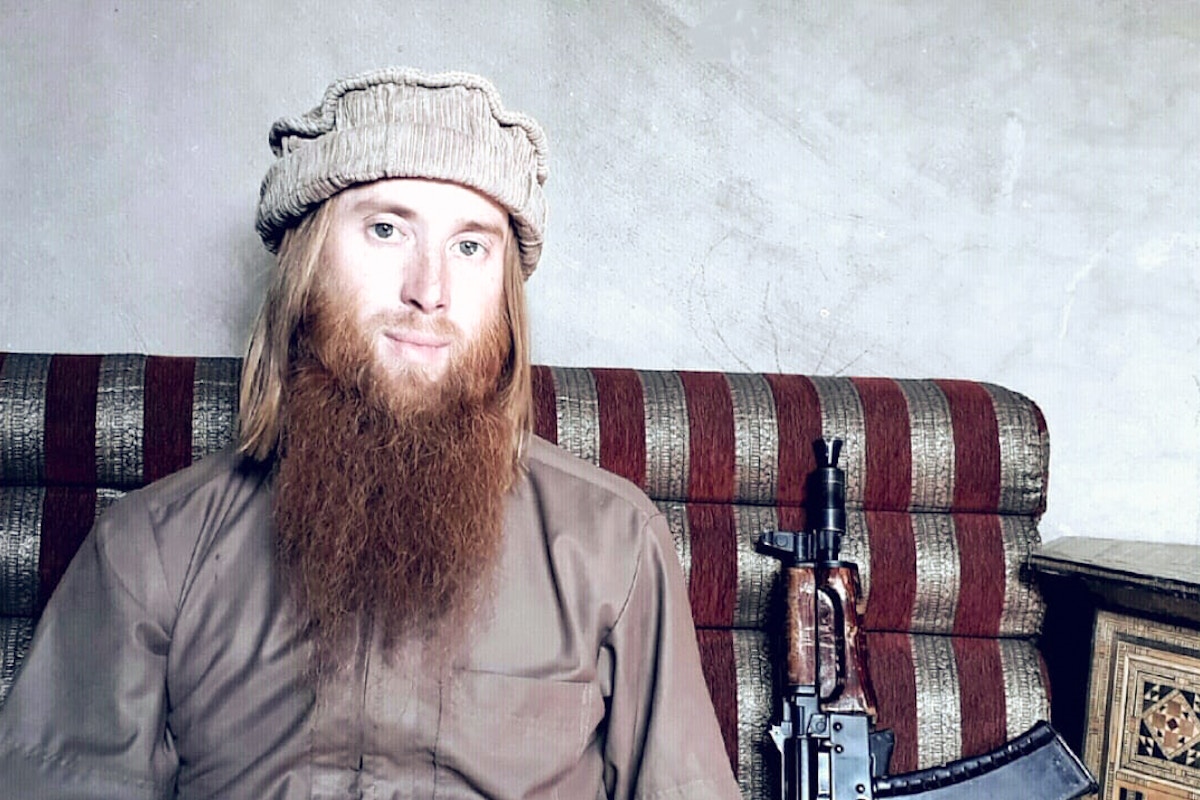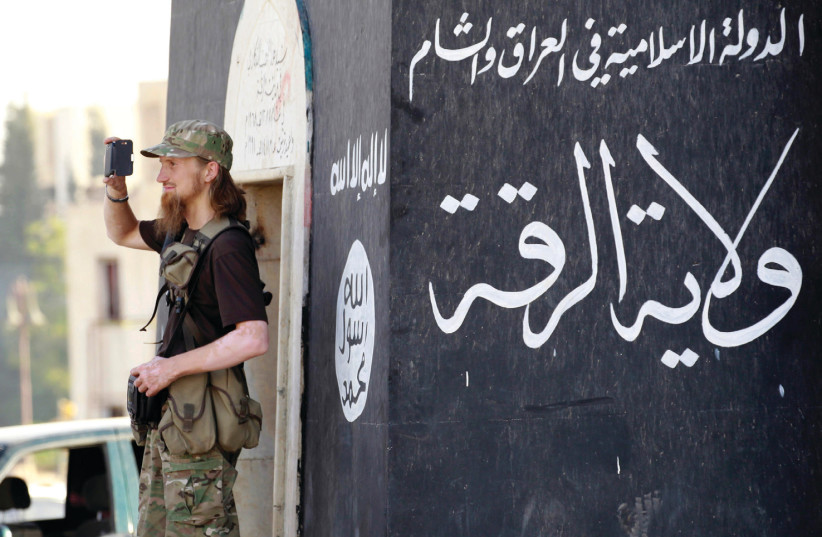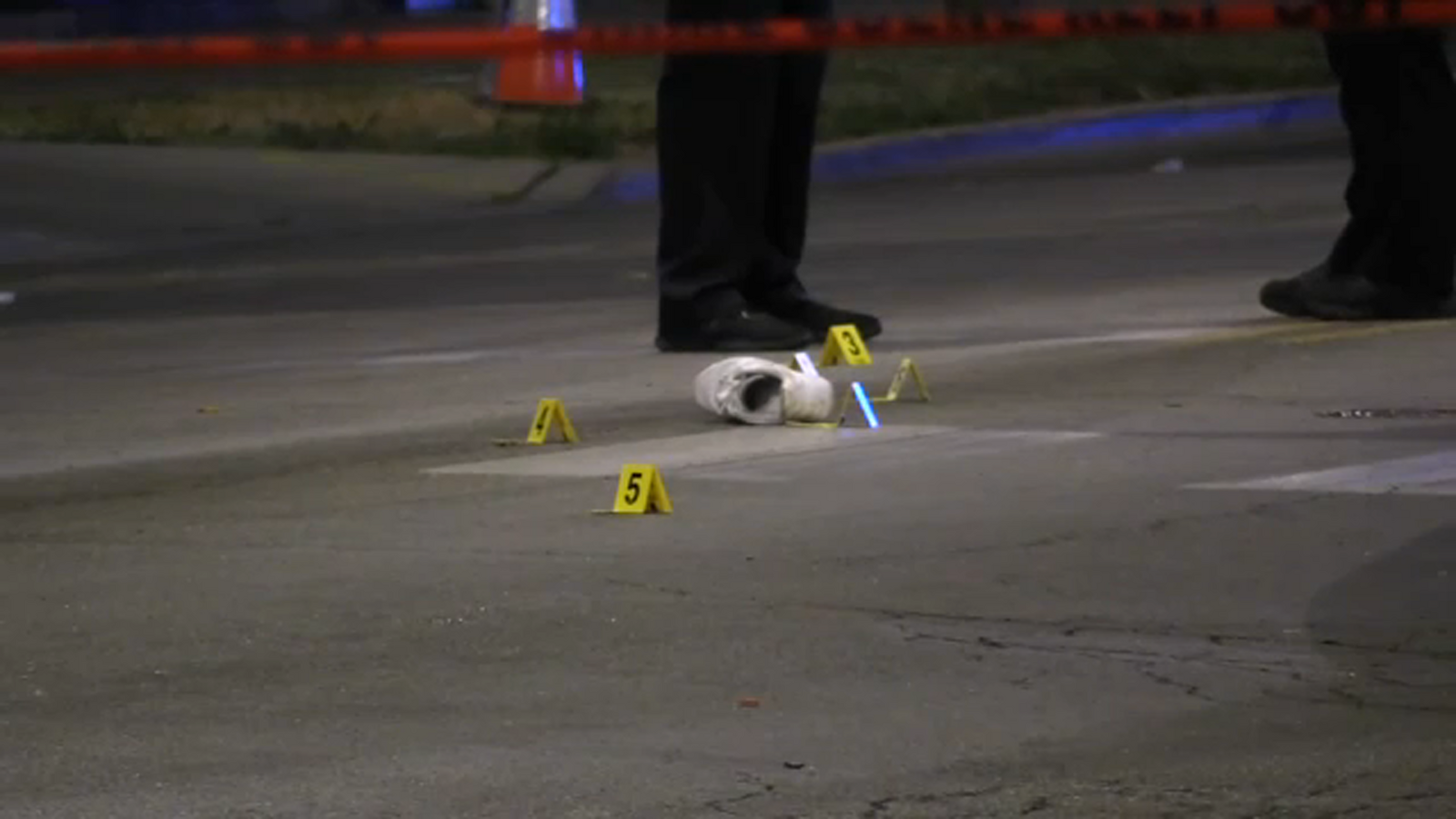I’d been speaking with Russell Dennison just about day-to-day for more than six months when his messages quickly stopped coming.
Dennison was a devout Muslim. He thought the time and position of his dying ended up predetermined, that if a bomb were being intended for him, it would eliminate him, regardless of anything he may possibly do to stay away from it. That bomb located him in the spring of 2019 in Baghuz, a modest village in eastern Syria in the vicinity of the border with Iraq. I uncovered of his death months later on, following a witness told Dennison’s Syrian wife, and she advised me.
A red-bearded American who was raised Catholic in the Pennsylvania suburbs, Dennison was amongst the 1st Americans to be a part of the Islamic Condition, or ISIS. I had to begin with tried to speak to him in 2014, right after hearing rumors that he’d left the United States to combat in the Syrian civil war. For many years, I received no reaction. Then in August 2018 — after fleeing Raqqa as U.S.-led coalition forces approached ISIS’s de facto money — Dennison emailed me. He wished to converse.
In the months that adopted, he despatched me much more than 30 several hours of audio recordings by way of WhatsApp. Talking predominantly at evening, with the rumble of coalition airstrikes in the track record, he described his conversion to Islam in Pennsylvania, his drift to extremism in Florida, and his journey by the Middle East and throughout the Lebanese-Syrian border to sign up for the world’s most notorious and feared terrorist group. As our discussion deepened, his recordings took on a confessional good quality.
Nowadays, The Intercept and Matter Studios are releasing American ISIS, an 8-episode Audible Unique documentary podcast that supplies the most thorough and critical account yet of an American who lived and died within the ISIS caliphate. Dennison’s recordings supply a firsthand watch of existence in ISIS-controlled territory and expose new facts about how the terrorist team functioned, from its arrival in Syria as an insurgent power to its establishment of a quasi-condition governing lands the sizing of Kentucky.
Virtually two many years following the 9/11 attacks prompted the United States to start its international “war on terror,” Dennison’s story also serves as a travelogue as a result of a dark and treacherous interval when the danger of Islamist terrorism was used to justify a crackdown on American Muslims and ISIS rose from the chaos and violence of the U.S. war in Iraq.
Dennison was imprisoned in his early 20s for selling a tiny amount of money of marijuana and later radicalized amid the beaches and strip malls of the Tampa Bay space, where he poured his disappointment with U.S. plan into diatribes that won him a devoted following on YouTube — and unwanted attention from the FBI. Dennison informed me that the bureau’s pursuit of him and other American Muslims in those many years sent him hunting for a thing he felt he couldn’t find in the place of his beginning: independence to practice his faith and lead a pure Islamic lifestyle.
He set off for Iraq, Egypt, Jordan, and Lebanon prior to crossing into Syria in 2012. After there, he observed that the caliphate founded by Abu Bakr al-Baghdadi had its very own complications, from unaccountable stability forces to negative choices that contributed to the decline of territory and the deaths of hundreds of ISIS fighters, alongside with hundreds of civilians. Dennison’s romance with ISIS was elaborate. He wasn’t a blind follower, however in his conversations with me, he danced all over his personal culpability for the loss of life and destruction ISIS wrought.
Eliciting Dennison’s story was a single of most extreme reporting attempts of my vocation. He challenged what I imagined I realized about the Islamic State and its fighters and what drove them to Syria, Iraq, and other nations in conflict. Even as I arrived to know him intimately via months of key communications — and even as I empathized with some factors of what he explained to me, like his tries to smuggle his spouse and compact young children out of ISIS territory as bombs fell close to them — I understood there was only just one probable ending to our partnership: Dennison would be killed.
In actuality, I’d agreed to Dennison’s one term in trade for his full cooperation with my reporting for American ISIS: I wouldn’t expose his id or notify his tale until he was killed or captured. But our deal was in truth of the matter contingent on Dennison’s dying, because he experienced also advised me that he’d by no means be taken alive.
“Being captured is the last point that any brother here would want to take place to him,” Dennison told me. “So your solution is combating until finally the death.”
Dennison’s request presented a host of moral problems. Evidently, his objectives in sharing his story with me have been not the same as my objectives in telling it, and I was wary of getting to be the automobile for an try to justify or glamorize his preference to be a part of a brutal band of spiritual extremists. In the end, I resolved that Dennison’s uncommon, candid testimony — including his firsthand account of the group’s abuses — would allow me to give listeners a exclusive and contextualized glance within the ISIS caliphate.


Still left/Top: Russell Dennison, appropriate, holds the ISIS flag with an additional militant in Syria.Proper/Base: Russell Dennison’s photograph of the destruction from the U.S.-led bombing campaign against ISIS in Syria’s Deir Ezzor province.Pictures: Attained by The Intercept
Reporting on ISIS is uniquely hard. The spots of Syria that the group controlled at the time have been largely inaccessible and shrouded in a fog of war. There was a possibility that this was a hoax: that the individual I was communicating with wasn’t Dennison, or that Dennison was not an ISIS fighter.
To be certain that he was who he claimed he was — and where by he explained he was — I requested him for details handful of some others could know. His accounts of his interviews with the FBI matched those people I acquired from his FBI file, which is not publicly out there. He also despatched me pictures: pics of himself as a baby in the United States and in Syria with other ISIS fighters, as nicely as snapshots of documents, which includes his laminated ISIS identification card and pages from his U.S. passport. He handed each individual examination I devised to authenticate him.
Data Dennison presented from the ground in Syria, in actual time, delivered additional evidence of his id. At the conclude of 2018 and the beginning of 2019, he lived through the U.S.-led bombing campaign that was intended to dislodge ISIS from the last territory the team controlled in jap Syria. I reported on these bombings at the time. My tales revealed that the U.S.-led coalition had specific a healthcare facility, that the bombs experienced leveled a small city in japanese Syria on New Year’s Eve, and that the United States experienced stopped delivering specific details about targets in the bombing campaign as it was also dropping propaganda leaflets on surviving ISIS fighters. I can now expose that a single of my sources for these tales was Dennison, who initial explained to me about the assault on the hospital and despatched me images from the ground. The U.S. Defense Office later on verified most of Dennison’s info, which includes the bombing of the hospital.
As I was doing work on American ISIS, the podcast “Caliphate” — a collection about ISIS from the New York Times — imploded, with its key subject, Shehroze Chaudhry, billed criminally in Canada for perpetrating a terrorist hoax and the Times concluding that the podcast “ought to not have been developed” with Chaudhry as its protagonist. I realized that comparisons concerning “Caliphate” and my personal venture would be unavoidable. Its collapse was but one more reminder of what could transpire if I wasn’t comprehensive plenty of in verifying Dennison’s identity and interrogating his account.
So after Dennison’s loss of life, I tracked down persons he had known. Most agreed to be interviewed for the podcast. A spiritual mentor in Florida explained Dennison’s embrace of Salafi jihadism, a tough-line Islamist ideology. A pal of Dennison’s in Michigan told me about visiting him in Iraq, just before he traveled to Lebanon and crossed the border into Syria. One particular of Dennison’s family members agreed to chat to me, so extended as I did not history her or use her title. Anyone I talked to verified Dennison’s story.
I also learned info about Dennison that he had been hesitant to share, which includes that he was married briefly in Syria to Tareena Shakil, the very first British woman to be prosecuted for becoming a member of ISIS and a bona fide media feeling in the United Kingdom, where newspapers released photographs of her posing with an assault rifle and a handgun.
In addition, I vetted Dennison and his tale with a CIA and FBI informant who has near connections to ISIS. I’d sent her a picture of Dennison and requested if she regarded him she said she didn’t. Months later on, following ISIS chief Baghdadi blew himself up in a tunnel in Syria, she contacted me. She reported the FBI was using a new appear at People in america who experienced joined ISIS, and federal brokers experienced confirmed her a bunch of images, which include a single of a purple-bearded person.
She recognized Dennison from the photograph I’d sent her. Extensive right after Dennison’s death, the FBI was continue to looking for him.
Indicator up for a totally free 30-working day demo and hear to the comprehensive American ISIS series on Audible.












